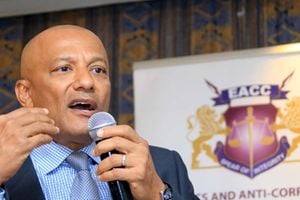
Bishop David Oginde during the launch of the EACC Strategic Plan aimed at aiding the fight against corruption at KICC on September 26, 2023.
When the National Assembly’s Justice and Legal Affairs Committee (JLAC) met on July 31 to hear from stakeholders on proposed changes to the Ethics and Anti-Corruption Commission (EACC) Act, a plot was hatched to end Bishop David Oginde’s term as the anti-graft tsar, barely a year into office.
The meeting on the third floor of Bunge Tower kicked off at 10:20am with JLAC Chairperson, Tharaka MP George Gitonga Murugara, running the show.
Eight of the committee members – Mr Murugara, his deputy Eckomas Mutuse (Kibwezi West), John Makali (Kanduyi), Edward Muriu (Gatanga), Jane Maina (Kirinyaga Woman Representative), John Kaguchia (Mukurwe-ini), Stephen Mogaka (West Mugirango) and Aden Daud (Wajir East) – sat that day.
Absent committee members were Farah Maalim (Dadaab), TJ Kajwang (Ruaraka), Junet Mohamed (Suna East), Otiende Amollo (Rarieda), Silvanus Osoro (South Mugirango), Michael Muchira (Ol Jorok) and Amina Ugdoon Siyad (Garissa Woman Representative).
The meeting was intended to get views from stakeholders on the proposed law changes, and was set to attract controversy as it drastically changed academic qualifications required to be EACC Chairperson.
Particularly, the Ethics and Anti-Corruption Commission (Amendment) Bill, 2024 seeks to limit the agency’s top boss to someone with the qualifications of a High Court judge.
To qualify as a High Court judge, one must possess a law degree from a recognised university and have at least 10 years’ experience as an advocate, magistrate, judge or a distinguished academic.
Clause 3 of the Bill, however, is a saving grace, stating that “section 2 of this Act (on qualifications for the EACC Chairperson) shall not apply to a person who immediately before the commencement of this Act was serving as a Chairperson of the Commission,” the Bill reads.
But when the meeting ended at 12:10pm, the MPs had resolved to delete clause 3 of the Bill.
This means that if the rest of the August House votes to pass the Bill, and President William Ruto signs it into law, Bishop Oginde would be fired as soon as the ink dries.
Bishop Oginde took oath of office on May 9, 2023 after President Ruto nominated him to replace anther clergyman, Archbishop Eliud Wabukala, who served for six years.
During Bishop Oginde's tenure, the EACC has had standoffs with Director of Public Prosecutions (DPP) Renson Ingonga on the latter’s attempt to withdraw several corruption cases, some of which were nearing conclusion.
The two agencies have clashed over the DPP’s decision to withdraw corruption cases involving former officials of the Geothermal Development Corporation, Kenya Pipeline Company and the Rural Electrification and Renewable Energy Corporation.
The latest clash followed President Ruto’s nomination of former Kakamega governor Wycliffe Oparanya to the Cabinet.
The DPP withdrew his consent to prosecute Mr Oparanya for alleged corruption and abuse of office while still Kakamega County’s CEO, sparking a war of words with the EACC.
The anti-graft body believed that Mr Ingonga’s decision was sparked by Mr Oparanya’s nomination to the Cabinet. Mr Oparanya has been sworn in as Cabinet Secretary for Cooperatives and MSMEs.
The EACC (Amendment) Bill, 2024 is just one of nine proposed law changes contained in the National Dialogue Committee (Nadco) report.
It is the second to be taken through Parliament after the IEBC (Amendment) Bill, 2024 which President Ruto signed into law on July 9.
The JLAC’s proposal is contained in its report, which Mr Murugara tabled in the House on August 6. The House adopted the report.
In the document, the JLAC said that its recommendation is intended to ensure that the EACC benefits from the law changes with immediate effect.
“The Committee resolved to recommend to the House the approval of the Ethics and Anti-Corruption Commission (Amendment) Bill (National Assembly Bill No.11 of 2024), with an amendment to delete clause 3 which was a saving provision. The Committee noted that there was need to ensure that, after commencement of the Act, the Commission benefits immediately from a Chairperson who is a person qualified to be a judge of the High Court, hence the proposed amendment,” the report reads in part.
Currently, section 5 of the EACC provides for the anti-graft body’s Chairperson to possess a degree from either ethics and governance, law, public administration, leadership, economics, social studies, audit, accounting, fraud investigation, public relations and media, religious studies or philosophy.
EACC Deputy CEO Abdi Mohamud, in opposing the proposed law change, told the JLAC that the proposed change discriminates against other fields of study, and that non-law graduates may be best placed to inject fresh ideas in the fight against graft.
He added that the anti-graft body has a fully-fledged legal department, and that some of its personnel meet the qualifications for High Court judges.
“Legal professionals may possess strong legal expertise but may lack skills and experience in leadership other areas relevant to anti-corruption work, such as investigation techniques, financial analysis, corruption prevention and advocacy,” Mr Mohamud told the committee.
Before the JLAC, Mr Mohamud stood alone in opposing the proposed changes.
The Office of the Director of Public Prosecutions (ODPP) was represented by Geoffrey Obiri.
Mr Obiri, an Assistant Director of Public Prosecutions argued that having a High Court judge equivalent at the helm of the EACC would ensure that the office holder understands the law in relation to the graft fight.
He added that the move would improve the quality of decisions from the EACC.
The Kenya Law Reform Commission and Law Society of Kenya did not oppose the proposed law change.
Two individuals – Levin Njau and Anthony Mulili – also submitted memoranda to the committee.
Mr Njau suggested that the law be amended to strengthen oversight mechanisms to oversight EACC, develop clear implementation plans, enhance public participation through civic education and clarify legal provisions touching on corruption.
Mr Mulili held that the EACC be granted powers to prosecute. Under current law, only the DPP can prosecute suspects. Members of the public can, however, petition courts to allow them pursue private prosecution.









